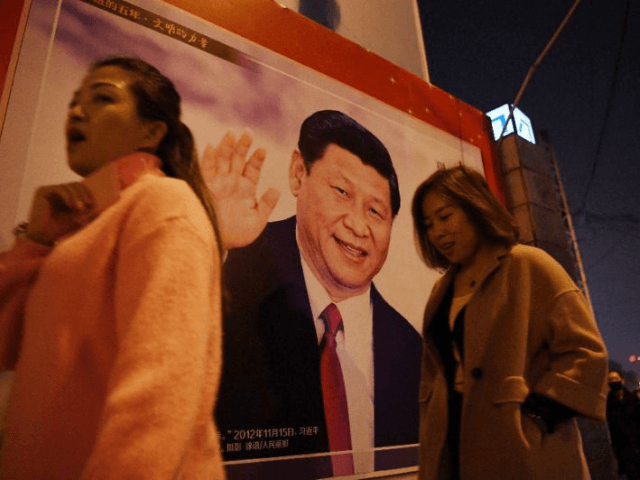Not surprisingly, China’s state-run media thinks very highly of President Xi Jinping, who assumed near-dictatorial powers and a second five-year term at the recent Communist Party Congress in Beijing.
A gushing profile published by the Xinhua news service on Friday celebrated Xi as “a man who makes things happen.”
Xinhua sets Xi up as a plucky underdog who came into office facing a “plethora of headaches,” including “a slowing economy, a widening wealth gap, corruption, and environmental woes.” 1,800 days later, no one in China doubts the great man’s ability to deal with these challenges:
A total of 360 major reform plans were put forward and over 1,500 reform measures launched, establishing a general framework for reform in major fields and lending greater impetus to growth.
The economy expanded at an average annual rate of 7.2 percent between 2013 and 2016, outstripping the 2.5-percent average global growth.
More than 60 million people have bid goodbye to poverty.
Hundreds of officials at or above provincial or corps level have been investigated for corruption and a campaign targeting undesirable working styles has ensured that the Party with over 89 million members stayed pure and grew stronger.
The two million-strong Chinese military has reshaped its way of thinking and work style, organizational form and armament.
The “strictest environmental protection system” was put in place and numbers of officials were punished for insufficient work in this regard.
Expect to hear a lot more about China’s environmental renaissance, no matter how heavy the cloud of pollution over Chinese cities might be, because Xi’s political technicians understand the key to controlling the global left is to make the right noises about global warming. Authoritarian leaders can say whatever they need to at international forums without having to worry about being forced to do anything contrary to their economic interests.
Xinhua celebrates China’s “major progress in scientific and technological fields”—without, of course, mentioning the massive theft of intellectual property that made it possible—and celebrates historic meetings between Beijing and Taipei without mentioning that China has been methodically bribing and intimidating Taiwan’s allies into abandoning them. In fact, China just announced Panama’s rich rewards for abandoning Taiwan on Friday.
The Xinhua profile is virtually a novella, running into thousands of words, but the common theme is that Xi is a man of unique vision and unshakeable will who cleaned up pervasive corruption in China, persisting even when other officials were congratulating him on a job well done and suggesting he take a break from his labors two years ago. A mere 75 percent of Chinese citizens were happy with the progress of the anti-corruption crusade when Xi took office, but now it is up to 92.9 percent.
He instantly ordered reforms to eliminate wasteful spending on food and recreation by Chinese officials simply because he read an article about it, and in just five short years, “a mission once believed to be impossible” was completed. China’s officials now religiously follow Xi’s eight-point plan for honest bureaucracy and have become devoted, and presumably slimmer, servants of the Communist Party.
The glories of communism are celebrated throughout the profile, including a creepy story Xi tells about a writer who was so passionate about translating the Communist Manifesto into Chinese that he accidentally ate ink instead of sugar and declared, “The taste of truth is so sweet.”
The unswerving loyalty of Xi’s family to communism despite unjust persecution by corrupt officials is stressed. Xi’s mom even tattooed a reminder to “serve the country with total loyalty” on his back, which frankly is not the best place to tattoo a reminder.
Xi is credited with having a great rapport with the common man, and a rare gift for explaining complex ideas in simple terms. He is said to be fond of popping up among the proletariat at diners, gift shops, work sites, barns, nursing homes, kitchens, disaster scenes, and poverty-stricken areas, announcing himself as a humble “servant of the people.” His political chats draw “numerous clicks and many thumbs-up on the Internet.” He is currently working on eliminating poverty altogether, which Xinhua prematurely declares an achievement “unprecedented in human history.”
Everything in China is carefully planned and expertly coordinated under Xi, according to Xinhua’s account. In addition to his eight-point plan for not wasting public money on bureaucratic indulgences, he has a “five-sphere integrated plan” for “coordinated economic, political, cultural, social, and ecological advancement,” and a “four-pronged comprehensive strategy” for “building a moderately prosperous society in all respects, deepen reform, advance law-based governance and strengthen Party governance.” No matter what time of night a report is submitted to him, it is “returned with instructions the following morning.”
Xinhua describes Xi’s long-term vision as building “a great modern socialist country” which aims for “socialism’s triumph over capitalism” by avoiding the “middle-income trap” and other mistakes made by socialist governments. In most other countries, socialists take great pains to insist they are not communists, but China is much more relaxed about the distinction.
The key concepts running through this profile are force and obedience. Xi is praised in Olympian terms because the message is that concentration of dictatorial power in his person is wise and just. He started from humble origins and earned his authority.
Xinhua clearly indicates Xi’s much-lauded “reforms” and what they portend about the version of “socialism” he plans to sell to the world. The point of every anecdote related by Xinhua is that Xi had the power to do what was previously deemed “impossible” or “nearly impossible,” because Chinese citizens, and even high officials, have only such “rights” as their government sees fit to recognize.
The fantasy of a great man bestriding the world like a colossus and using unparalleled authority to inaugurate an era of universal prosperity and social justice is not new. The question is always whether the free world has the courage to fight back—economically, philosophically, and physically if necessary.

COMMENTS
Please let us know if you're having issues with commenting.